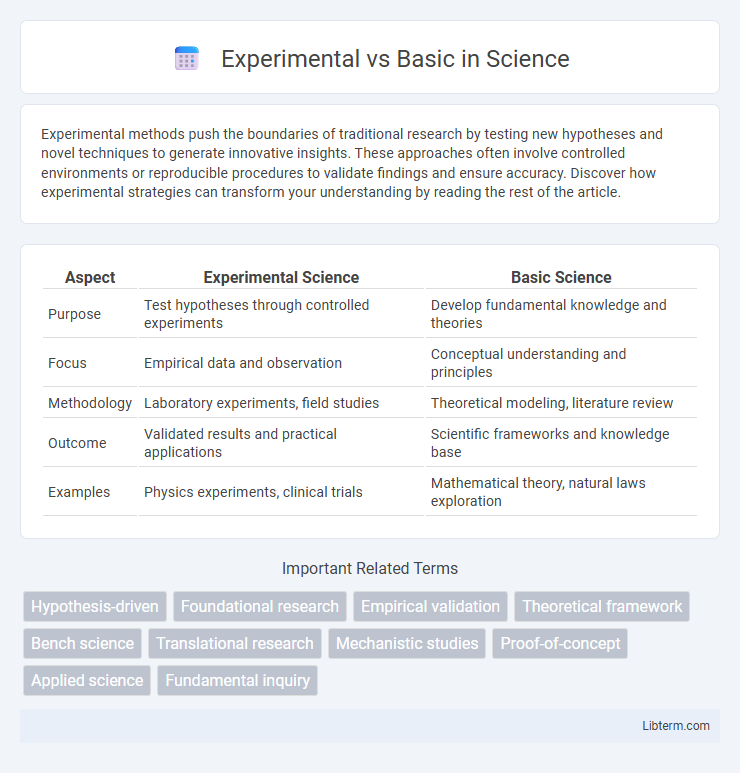Experimental methods push the boundaries of traditional research by testing new hypotheses and novel techniques to generate innovative insights. These approaches often involve controlled environments or reproducible procedures to validate findings and ensure accuracy. Discover how experimental strategies can transform your understanding by reading the rest of the article.
Table of Comparison
| Aspect | Experimental Science | Basic Science |
|---|---|---|
| Purpose | Test hypotheses through controlled experiments | Develop fundamental knowledge and theories |
| Focus | Empirical data and observation | Conceptual understanding and principles |
| Methodology | Laboratory experiments, field studies | Theoretical modeling, literature review |
| Outcome | Validated results and practical applications | Scientific frameworks and knowledge base |
| Examples | Physics experiments, clinical trials | Mathematical theory, natural laws exploration |
Introduction to Experimental and Basic Approaches
Experimental approaches involve systematic manipulation of variables under controlled conditions to establish cause-and-effect relationships, commonly used in scientific research and clinical trials. Basic approaches prioritize understanding fundamental principles and theories through observation, description, and analysis without active intervention, often forming the foundation for experimental studies. Both methods contribute crucial insights, with basic approaches generating hypotheses and experimental methods validating them through empirical evidence.
Defining Experimental Methods
Experimental methods involve systematic manipulation of variables to observe causal effects, emphasizing controlled environments and reproducibility. Basic methods focus on foundational data gathering, such as observation and measurement, without intervention or variable alteration. Defining experimental methods centers on hypothesis testing through controlled trials to establish cause-and-effect relationships.
Understanding Basic Concepts
Understanding basic concepts forms the foundation of experimental research by clarifying key variables, hypotheses, and methodologies that guide empirical investigation. Experimental approaches apply these fundamentals to test cause-and-effect relationships through controlled manipulation and observation. Mastery of basic principles enhances the design, implementation, and interpretation of experimental studies, ensuring valid and reliable results.
Key Differences Between Experimental and Basic
Experimental research emphasizes hypothesis testing through controlled and manipulated variables to establish causality, while basic research focuses on generating fundamental knowledge without immediate practical application. Experimental studies employ randomized control groups and precise measurements to evaluate outcomes, whereas basic research prioritizes theoretical understanding and concept development. The key difference lies in experimental research's goal to verify cause-effect relationships versus basic research's aim to explore underlying principles.
Applications in Scientific Research
Experimental research focuses on testing hypotheses through controlled methods and empirical data collection, enabling precise measurement of variables and cause-effect relationships. Basic research aims to expand fundamental knowledge without immediate practical applications, often exploring theoretical principles and underlying mechanisms. Applications in scientific research leverage experimental methods to validate theories generated by basic research, driving innovation in fields such as medicine, physics, and environmental science.
Advantages of Experimental Methods
Experimental methods offer precise control over variables, enabling researchers to establish cause-and-effect relationships with greater confidence. These methods enhance internal validity through systematic manipulation and random assignment, reducing bias and confounding factors. The ability to replicate experiments ensures reliability and strengthens the evidence supporting scientific theories.
Strengths of Basic Approaches
Basic approaches in research provide a strong foundation for understanding fundamental principles and establishing baseline data essential for experimental studies. Their strength lies in systematic observation and replication, which build consistent and reliable knowledge without the complexities introduced by experimental manipulation. This simplicity allows for clear attribution of cause and effect relationships and supports the development of robust theoretical models.
Challenges and Limitations
Experimental methods often face challenges such as high costs, limited scalability, and the need for precise control over variables, which can restrict the scope of reproducibility and applicability. Basic research encounters limitations in translating findings into practical solutions due to its theoretical nature and sometimes insufficient real-world context. Both approaches require balancing rigor and flexibility to address the complexities inherent in their respective domains.
Comparative Case Studies
Comparative case studies in experimental research emphasize controlled manipulation of variables to establish causal relationships, while basic research employs observational or descriptive approaches to understand fundamental principles without direct intervention. Experimental case studies offer high internal validity and precise measurement of outcomes, in contrast to basic case studies which prioritize depth and breadth of contextual understanding. This distinction highlights experimental studies' strength in hypothesis testing compared to basic studies' focus on theory development.
Conclusion: Choosing the Right Approach
Selecting between experimental and basic research depends on the objective of the study; experimental research excels in hypothesis testing through controlled variables and measurable outcomes, offering empirical evidence and practical applications. Basic research contributes to foundational knowledge by exploring theoretical concepts and underlying principles without immediate commercial intent, driving long-term scientific advancements. The optimal approach aligns with the research goals, resource availability, and desired impact, ensuring the methodology supports clear, reliable conclusions.
Experimental Infographic

 libterm.com
libterm.com